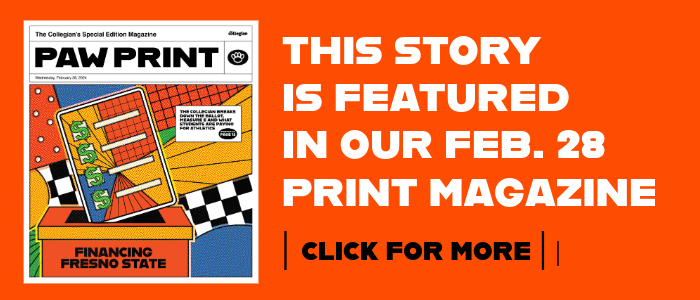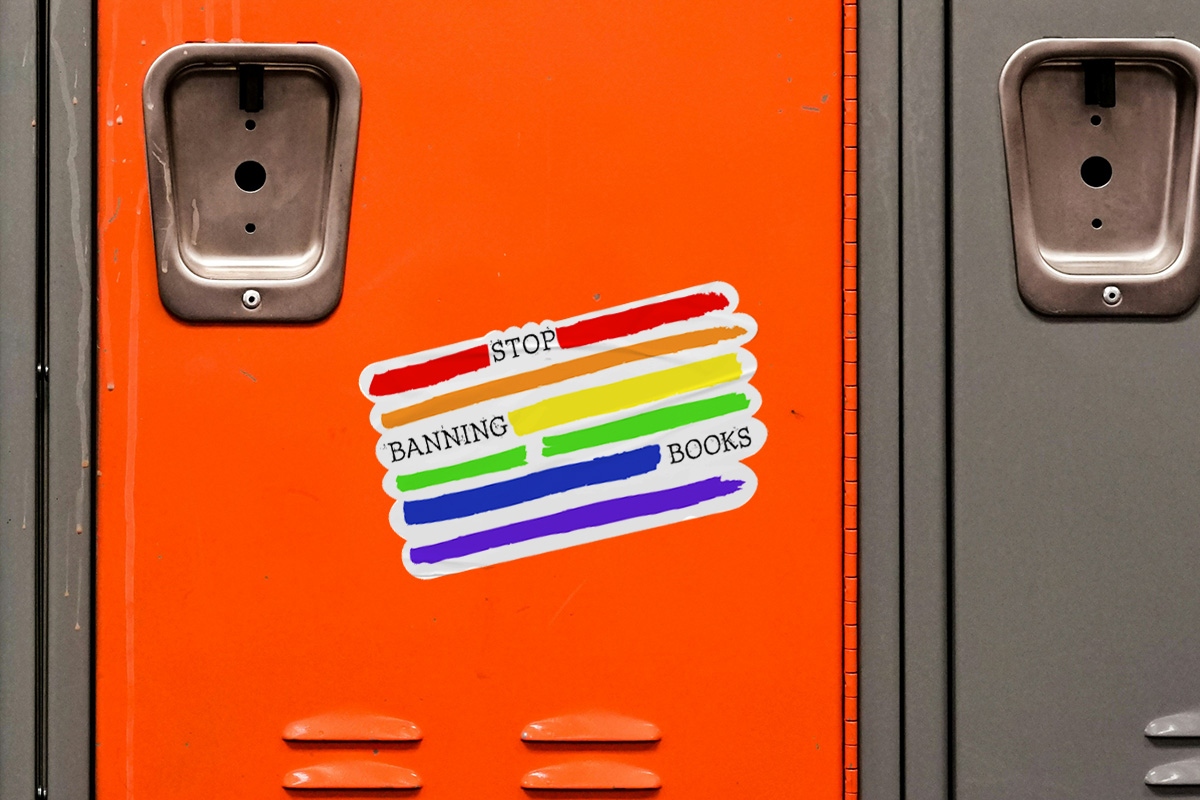This story is part one of a two-part series. The second part can be found in the Lifestyle section.
PART 1: The Banning of books featuring LGBTQ stories from education and its effects
The banning of books from the education system is not a new process but has been a tool of manipulation for centuries, with the first documented case being in 1634 and the prohibition of Thomas Morton’s ”New English Canaan” by the Puritans.
Now, in the 21st century, living in a country with heavy emphasis on its First Amendment right of freedom of speech and press, banning books seems absurd. Yet those in power continue to ban books to maintain a sense of control.
In September 2023, as a part of Florida Governor Ron DeSantis’ “Don’t Say Gay” policy, Florida officials signed an order to remove all books featuring LGBTQ+ characters, themes and stories from classrooms, curriculum and school libraries, regardless if the book was sexual or not.
 In Fresno County, the Board of Supervisors proposed the Parents Matter Act in November 2023, which calls for books deemed age-inappropriate to be removed from the children’s section of local libraries. Books containing themes of gender identity are included under this act.
In Fresno County, the Board of Supervisors proposed the Parents Matter Act in November 2023, which calls for books deemed age-inappropriate to be removed from the children’s section of local libraries. Books containing themes of gender identity are included under this act.
A little over a year ago, I listened to an episode of The Daily Podcast, “When Book Bans Came to Small-Town New Jersey,” and was angered by what I heard; as a supporter of critical literacy in education, the banning of books featuring LGBTQ+ characters undoes what critical literacy’s goal is, to grow students into understanding adults.
The Department of Education explains that critical literacy “encourages readers to question, explore, or challenge the power relationships that exist between authors and readers.”
For generations, those who hold power have been the ones to write and control history.
As an English Studies major, being aware of the policies surrounding education and literature is an important part of my studies, especially how these policies contradict the lessons I have been taught throughout my academic career.
One of these lessons is the teachings of Haitian-born anthropologist Michel-Ralph Trouillot who speaks on the effects a single-story narrative can have in the classroom on the long-term beliefs of students.
Trouillot’s “Silencing The Past” discusses how the erasure of the Haitian Slave Revolt from history books caused a biased view of the Haitian people.
Trouillot explains how literature has the power to alter opinion and create bias. In his writings, he explains how what students read and learn in their classrooms greatly impacts their beliefs and values.
“Power does not enter the story once and for all, but at different angles, it proceeds the narratives proper, contributes to its creation and interpretation,” Trouillot writes in “Silencing The Past,” in regards to how hidden agendas by powerful parties greatly impact a person’s belief system.
Drawing on my knowledge of critical literacy and the writings of Trouillot, the ideology of those in power determining whose story gets to be told is mirrored in the banning of books containing LGBTQ+ themes from school libraries by concerned parents.
The topic of sexuality being present in schools is something much contested and parents have gone as far as ensuring that library books predominantly featuring LGBTQ+ characters are removed from the shelves and are ridden from schools. Parents attempting to erase a minority voice within the educational system are perpetrating the narratives that Trouillot warns against.
I believe that the erasure of LBGTQ+ literature results in a misguided view of LGBTQ+ history; if one learns about the AIDS epidemic from the viewpoint that it was God’s punishment for homosexuality, an idea popularized in 1993 by Reverend Billy Graham, or if one never learns about this history at all due to the removal of any trace of sexuality from education. It erases a large part of the history of that event. It cultivates a negative connotation towards the LGBTQ+ community.
Tim Ramsy, the founder of Just Like Us, a nonprofit organization based in the United Kingdom that promotes acceptance of the LGBTQ+ community in schools, speaks on this topic and the positive outcome of pro-LGBTQ+ education in the home and schools from childhood in a Ted Talk.
Ramsy brings to light that merely being open to the idea of sexuality can make a huge impact on the lives of those within the LGBTQ+ community. He details the importance that educating youth on LGBTQ+ subjects and how existence helps to promote allyship and therefore create a safer society for the LGBTQ+ community to prosper in.
“We risk doing the equivalent of only teaching racism to people of color or gender inequality to women,” Ramsy said. “It doesn’t work, and we know that. But parents have that power to shape how young people discover who they are, and that’s something that we can change.”
In a previous class, I had a student bring up the issue that if schools were to teach LGBTQ+ history, then they should also be teaching straight history. This classmate also expressed that they believed that LGBTQ+ teachings act as propaganda to students.
However, the goal of LGBTQ+ education is not to teach how or why one should be LGBTQ+ but rather to show what it is like to be LGBTQ+ in history and today. Essentially being exposed to LGBTQ+ stories fosters a better sense of understanding towards the LGBTQ+ community.
Ginny Barnes, Fresno State librarian, discusses the importance of LGBTQ+ literature in education.
She points to the organization We Need Diverse Books and their use of the metaphor of windows and mirrors. For LGBTQ+ and Black, Indigenous and People of Color (BIPOC) students, books with LGBTQ+ and BIPOC characters act as mirrors. Students can see themselves and their communities in these stories. The books act as windows for students not a part of these communities.
“These books amplify their voices and affirm that BIPOC and LGBTQ+ lives matter… When these books are banned from schools or libraries, it can demonstrate that BIPOC and LGBTQ+ stories are not important or even don’t exist. It makes space for harmful narratives about LGBTQ+ and BIPOC people to perpetuate, which contributes to the violence committed against these communities,” Barnes said.
It is through understanding that acceptance is found. This is immensely true when it comes to allyship towards the LGBTQ+ community. By learning about the struggles LGBTQ people have fought to be in the place they currently are and what fights they are still working towards, one can appreciate their journey and hold kindness toward them in their hearts.
Schools that incorporate LGBTQ+ stories within their pre-existing curriculum provide a space in which LGBTQ+ education is easily accessible, thus in turn prompting both allyship towards the LGBTQ+ community and a safer environment for LGBTQ+ persons to live their day-to-day lives in.
“We do students a disservice when BIPOC and queer voices are not included in our curriculum because these voices are undeniably a part of our world. LGBTQ+ people have always existed and they will keep existing,” Barnes said. “In many cases, it is just a matter of making queer stories and history visible. In others, we need leaders to proudly and boldly advocate for the protection of our LGBTQ+ and BIPOC community.”
When asked how students can make a difference in putting an end to the banning of books.
“Students can vote! While book bans are not currently an issue at Fresno State, Fresno County Supervisor Steve Brandau’s ‘Parents Matter Act’ limits access to LGBTQ+ children’s books in the Fresno County Public Library system,” Barnes said.




